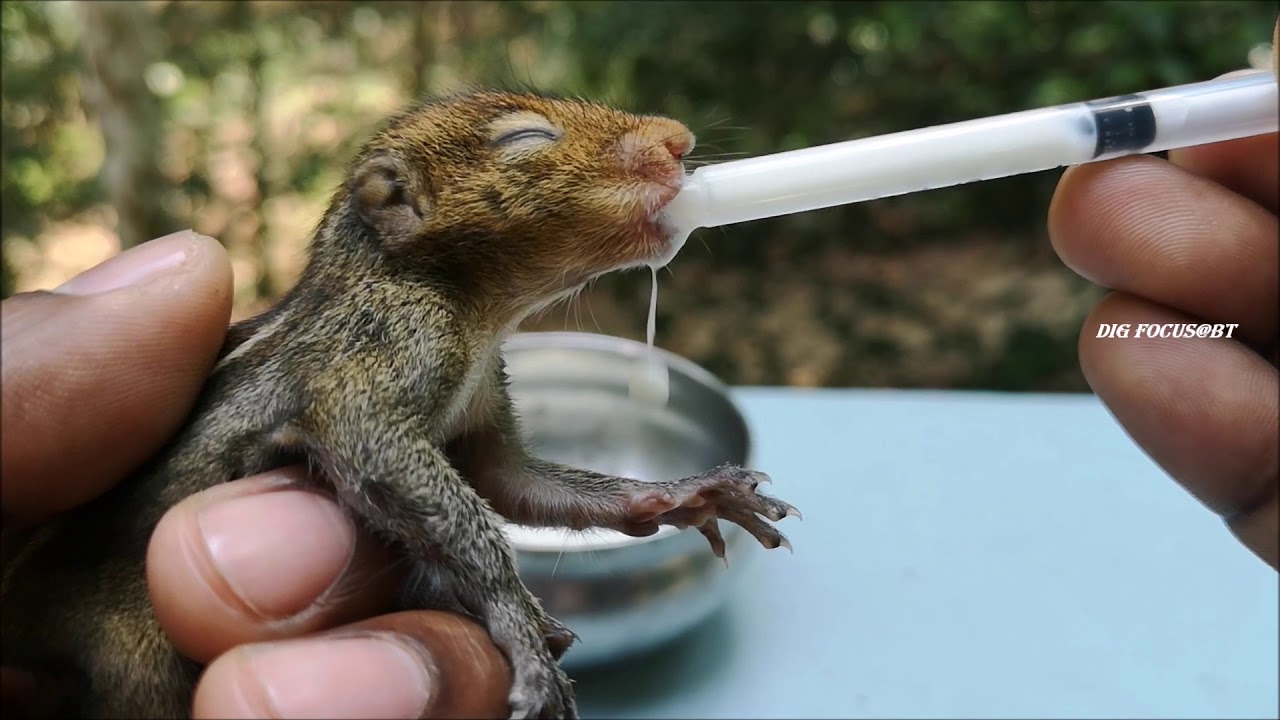
A Comprehensive Guide to Nurturing a Newborn Baby Squirrel
Introduction
Baby squirrels, also known as kittens or pups, are incredibly vulnerable and require specialized care to thrive. If you have stumbled upon an orphaned or abandoned baby squirrel, it is crucial to understand their unique needs and provide them with the proper care to ensure their survival and well-being. This comprehensive guide will equip you with the essential knowledge and practical steps to nurture a newborn baby squirrel successfully.
Assessing the Situation
Before embarking on the journey of caring for a baby squirrel, it is imperative to assess the situation carefully.
- Determine the Age: The age of the baby squirrel will influence the type of care it requires. Newborn squirrels are typically hairless, blind, and deaf. As they mature, they develop fur, open their eyes, and begin to hear.
- Check for Injuries: Examine the baby squirrel for any visible injuries or signs of distress. If you suspect an injury, seek professional veterinary assistance immediately.
- Identify the Species: There are various species of squirrels, and their care requirements may differ slightly. Determine the species of the baby squirrel to ensure you provide the most appropriate care.
Creating a Nurturing Environment
Providing a safe and comfortable environment is essential for the well-being of a baby squirrel.
- Nest Box: Create a cozy nest box lined with soft materials such as fleece or cotton balls. Place the nest box in a warm, quiet location away from drafts.
- Heat Source: Newborn baby squirrels are unable to regulate their body temperature. Provide a heat source, such as a heating pad set on low or a warm water bottle wrapped in a towel, to keep the baby warm.
- Humidity: Baby squirrels require a humid environment to prevent dehydration. Place a small dish of water near the nest box to increase humidity.
Feeding a Baby Squirrel
Proper nutrition is crucial for the growth and development of a baby squirrel.
- Formula: Feed the baby squirrel a specialized squirrel formula every 2-3 hours using a syringe or bottle. The formula should be warmed to body temperature before feeding.
- Feeding Schedule: Newborn baby squirrels need to be fed frequently. Establish a regular feeding schedule and stick to it as much as possible.
- Stimulating Elimination: After each feeding, gently rub the baby squirrel’s genital area with a warm, damp cloth to stimulate elimination.
Hygiene and Grooming
Maintaining proper hygiene is essential to prevent infections and promote the baby squirrel’s overall health.
- Cleaning: Keep the nest box clean by removing soiled materials regularly. Use a damp cloth to gently wipe the baby squirrel’s body and face.
- Grooming: As the baby squirrel grows, it will begin to groom itself. Provide a small brush or soft cloth to help it maintain its fur.
Socialization and Enrichment
Baby squirrels are social creatures and require interaction to develop properly.
- Handling: Handle the baby squirrel gently and frequently to socialize it. Talk to it in a soothing voice and provide it with gentle strokes.
- Playtime: Engage the baby squirrel in playtime by providing it with toys such as small balls or stuffed animals. Supervise playtime to ensure the baby’s safety.
Transitioning to Independence
As the baby squirrel matures, it will gradually become more independent.
- Weaning: Around 6-8 weeks of age, the baby squirrel can begin to be weaned from formula. Introduce solid foods such as nuts, seeds, and fruits.
- Outdoor Enclosure: Once the baby squirrel is fully weaned and has developed its coordination, provide it with an outdoor enclosure where it can practice climbing and foraging.
- Release: The ultimate goal is to release the baby squirrel back into the wild. When it is fully mature and has developed the necessary survival skills, consult with a wildlife rehabilitator to determine the appropriate time for release.
Special Considerations
- Orphaned Baby Squirrels: Orphaned baby squirrels require immediate attention. Contact a wildlife rehabilitator or veterinarian for guidance and assistance.
- Injured Baby Squirrels: Injured baby squirrels require professional veterinary care. Do not attempt to treat injuries on your own.
- Legal Considerations: In many areas, it is illegal to keep wildlife as pets. Check with local authorities to determine the legality of caring for a baby squirrel.
Conclusion
Nurturing a newborn baby squirrel is a rewarding but challenging endeavor. By providing a nurturing environment, proper nutrition, hygiene, socialization, and enrichment, you can help the baby squirrel thrive and eventually return to its natural habitat. Remember to consult with a wildlife rehabilitator or veterinarian for professional advice and support throughout the process.
